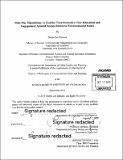Role-play simulations : a tool for transformative civic education and engagement around science-intensive environmental issues
Author(s)
Rumore, Danya Lee
DownloadFull printable version (33.81Mb)
Alternative title
Tool for transformative civic education and engagement around science-intensive environmental issues
Other Contributors
Massachusetts Institute of Technology. Department of Urban Studies and Planning.
Advisor
Lawrence Susskind.
Terms of use
Metadata
Show full item recordAbstract
This dissertation tests the effectiveness of tailored, science-based role-play simulations as a tool for transformative civic education and engagement around science-intensive environmental issues. I do so by studying the results of the New England Climate Adaptation Project (NECAP). NECAP was a two-year participatory action research project aimed at building the capacity of coastal New England communities to adapt to climate change while also testing the effectiveness of role-play simulations as a civic engagement tool. The project engaged 555 diverse stakeholders across four partner coastal New England municipalities in role-play simulation workshops. Data were collected through pre- and post-workshop questionnaires administered to all participants, follow-up interviews with 30 percent of participants from each workshop, and observation. Results show that, when used in a civic engagement context, role-play simulations can stimulate transformative learning about science-intensive environmental issues in the way the simulations are designed to. Participation in the NECAP simulations led to statistically significant increases in participant concern about local climate change risks, support for local adaptation action, and confidence in the prospects of effective local adaptation action. For many participants, the simulations also resulted in increased familiarity with and support for using the consensus building approach for local adaptation decision-making; increased empathy for different perspectives and interests related to adaptation; and generally enriched understanding of local climate change risks and adaptation options. Results were largely consistent across the four towns, as well as across people of different genders, age groups, income levels, education levels, and political viewpoints. The simulations had the greatest learning effect for people who came into the workshops being somewhat concerned about climate change risks. These findings suggest that role-plays are effective across diverse demographics, and that they may be particularly powerful for engaging people who are generally in the "undecided middle" in terms of their perspectives on the issue of interest. I conclude that tailored, science based role-play simulations do, in fact, offer a powerful approach for transformative learning and civic engagement around complex science-intensive environmental issues like climate change adaptation. I also explore the mechanism through which role-play simulations catalyze transformative learning.
Description
Thesis: Ph. D. in Environmental Policy and Planning, Massachusetts Institute of Technology, Department of Urban Studies and Planning, 2015. Cataloged from PDF version of thesis. Includes bibliographical references (pages 305-315).
Date issued
2015Department
Massachusetts Institute of Technology. Department of Urban Studies and PlanningPublisher
Massachusetts Institute of Technology
Keywords
Urban Studies and Planning.